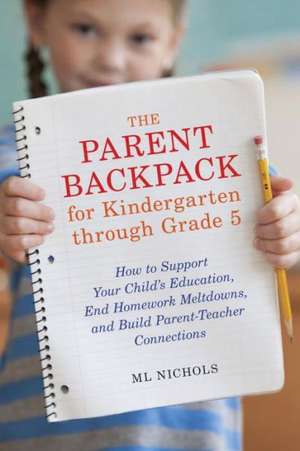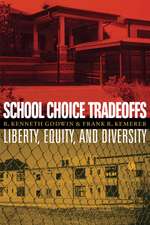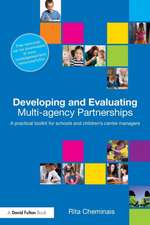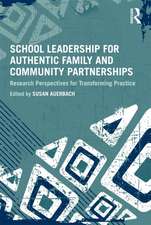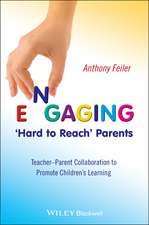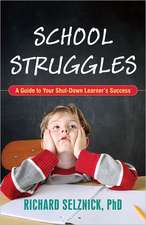The Parent Backpack for Kindergarten Through Grade 5: How to Support Your Child's Education, End Homework Meltdowns, and Build Parent-Teacher Connecti
Autor ML Nicholsen Limba Engleză Paperback – 22 iul 2013
Involved Parents = Better Students
How do you ensure your child gets the best education possible when U.S. schools have become overburdened, test-driven institutions that rank only average worldwide? Decades of research confirm that when parents engage with their children’s learning, kids do better in school—and life. This straight-talking guide helps you:
• understand the critical role you play in your child’s education,
• connect with educators in respectful ways,
• encourage a love of reading in your kids,
• minimize homework meltdowns and disorganization,
• support students who struggle academically,
• help children navigate social situations and bullying, and
• fuel your child’s mind and body for learning.
Parent involvement looks different for every family and every child. Packed with real stories and tested strategies, The Parent Backpack demystifies our complex education system and gives you the insights you need to help your kids thrive.
Preț: 104.16 lei
Nou
Puncte Express: 156
Preț estimativ în valută:
19.93€ • 21.72$ • 16.79£
19.93€ • 21.72$ • 16.79£
Carte disponibilă
Livrare economică 02-16 aprilie
Preluare comenzi: 021 569.72.76
Specificații
ISBN-13: 9781607744740
ISBN-10: 1607744740
Pagini: 306
Ilustrații: ONE COLOR
Dimensiuni: 158 x 232 x 21 mm
Greutate: 0.4 kg
Editura: Ten Speed Press
ISBN-10: 1607744740
Pagini: 306
Ilustrații: ONE COLOR
Dimensiuni: 158 x 232 x 21 mm
Greutate: 0.4 kg
Editura: Ten Speed Press
Notă biografică
ML Nichols is director of The Parent Connection, a nonprofit parent education group. While serving in leadership roles in her own district and on Parenting magazine’s Mom Congress on Learning and Education, she launched www.theparentbackpack.com. ML lives in the Boston area with her husband and two daughters.
Extras
How to Use This Book
The Parent Backpack for Kindergarten through Grade 5 is divided into three parts. Part one provides you with the big picture—the insights and perspective you need to be involved in your kid’s education in the right ways. These first four chapters give you a solid foundation for understanding your child’s journey, where education stands today, the important role you play as a parent, how to get involved, and what to expect. Part two gives you the background, practical tips, and tools you’ll need to navigate the many different phases you’ll discover as a parent of an elementary student—from learning to read to managing the social-emotional journey and communicating with teachers. Part three provides you with everything you need to know to support your children’s learning at home, including how to fuel little brains and bodies, end homework battles, and coach your kids on advocating for themselves.
If you’re feeling eager to jump ahead to a chapter that deals specifically with an issue that you need help with now, by all means, do that. This book can be read from beginning to end or by skipping around to relevant chapters. Be sure to read the first few chapters so you gain an understanding of the system, where it’s been, where it’s headed, and why your role in your child’s educational journey is so crucial. It’s important to understand where things stand and what to watch out for so you can be an effective advocate for your child.
Throughout the book, I share stories about real kids, real parents, and real teachers who have grappled with the same questions and situations that you might be experiencing. The names have been changed, but all of these stories are based on situations that I either experienced or heard about in consultations, interviews, or focus groups. Each chapter also ends with a list of Top Ten Takeaways. These are key summary points from each chapter: what to consider, to avoid, and to do. You can refer back to these takeaways after you’ve read the book. They are the reminders that we all need—that I still need—no matter how hard we try to parent well around education. It’s not always easy to do, especially in this busy, activity-crazed world we live in, but it is doable.
Getting involved in your child’s education today is tricky. No matter what zip code you live in or what school your child attends, there has never been more controversy about how we educate our children. Most of our schools struggle with test-driven mandates, higher expectations, underfunded budgets, and teachers who need more support. Add to this our hypercompetitive culture, and it all adds up to growing tension and fear among parents, teachers, and kids. Tension that trickles down even to our kindergarten classrooms. Expectations for student achievement turn some reasonable, levelheaded parents into unreasonable watchdogs, who often watch the wrong things, while other parents run the other way and hope for the best.
Our world is changing faster than our schools. Connecting to our children’s learning has never been more challenging—or more important. Our system has become so overburdened that in most schools, we parents have to advocate for our children more than ever before. But how we do that makes all the difference. The more parents we have who support education and advocate for their kids’ needs in effective ways, the better our schools will be. It’s up to parents and teachers to work together so that our children do get the best education possible.
I hope that The Parent Backpack helps to bridge the gap between parents and teachers. I hope it inspires you to support, encourage, and guide your children to do the best they can, knowing that their best will look different every day, and to cherish those questions that keep your kids’ curiosity alive. I hope the tools in each chapter help you advocate effectively for what your child needs. Most of all, I hope The Parent Backpack helps you discover and celebrate the joy within your child’s journey.
The Parent Backpack for Kindergarten through Grade 5 is divided into three parts. Part one provides you with the big picture—the insights and perspective you need to be involved in your kid’s education in the right ways. These first four chapters give you a solid foundation for understanding your child’s journey, where education stands today, the important role you play as a parent, how to get involved, and what to expect. Part two gives you the background, practical tips, and tools you’ll need to navigate the many different phases you’ll discover as a parent of an elementary student—from learning to read to managing the social-emotional journey and communicating with teachers. Part three provides you with everything you need to know to support your children’s learning at home, including how to fuel little brains and bodies, end homework battles, and coach your kids on advocating for themselves.
If you’re feeling eager to jump ahead to a chapter that deals specifically with an issue that you need help with now, by all means, do that. This book can be read from beginning to end or by skipping around to relevant chapters. Be sure to read the first few chapters so you gain an understanding of the system, where it’s been, where it’s headed, and why your role in your child’s educational journey is so crucial. It’s important to understand where things stand and what to watch out for so you can be an effective advocate for your child.
Throughout the book, I share stories about real kids, real parents, and real teachers who have grappled with the same questions and situations that you might be experiencing. The names have been changed, but all of these stories are based on situations that I either experienced or heard about in consultations, interviews, or focus groups. Each chapter also ends with a list of Top Ten Takeaways. These are key summary points from each chapter: what to consider, to avoid, and to do. You can refer back to these takeaways after you’ve read the book. They are the reminders that we all need—that I still need—no matter how hard we try to parent well around education. It’s not always easy to do, especially in this busy, activity-crazed world we live in, but it is doable.
Getting involved in your child’s education today is tricky. No matter what zip code you live in or what school your child attends, there has never been more controversy about how we educate our children. Most of our schools struggle with test-driven mandates, higher expectations, underfunded budgets, and teachers who need more support. Add to this our hypercompetitive culture, and it all adds up to growing tension and fear among parents, teachers, and kids. Tension that trickles down even to our kindergarten classrooms. Expectations for student achievement turn some reasonable, levelheaded parents into unreasonable watchdogs, who often watch the wrong things, while other parents run the other way and hope for the best.
Our world is changing faster than our schools. Connecting to our children’s learning has never been more challenging—or more important. Our system has become so overburdened that in most schools, we parents have to advocate for our children more than ever before. But how we do that makes all the difference. The more parents we have who support education and advocate for their kids’ needs in effective ways, the better our schools will be. It’s up to parents and teachers to work together so that our children do get the best education possible.
I hope that The Parent Backpack helps to bridge the gap between parents and teachers. I hope it inspires you to support, encourage, and guide your children to do the best they can, knowing that their best will look different every day, and to cherish those questions that keep your kids’ curiosity alive. I hope the tools in each chapter help you advocate effectively for what your child needs. Most of all, I hope The Parent Backpack helps you discover and celebrate the joy within your child’s journey.
Recenzii
“A smart, wise, and practical book every parent of a young child should own. What a trove of information; read this beautifully composed guide, sleep well, and enjoy with confidence your child’s education.”
—Edward Hallowell, MD, author, The Childhood Roots of Adult Happiness
“ML Nichols has given parents a long-overdue map through the ‘minefield’ of elementary education: where to turn and what to say and do (in and out of school) to become an effective advocate for your child.”
—Jim Trelease, author, The Read-Aloud Handbook
“As a psychologist and parent of three elementary-age children, I highly recommend this book. Its concrete strategies empower you to build strong partnerships with teachers and tap your child’s natural motivation to learn.”
—Dr. Donna Pincus, author, Growing Up Brave
"In this approachable guide, Nichols offers practical advice to parents on everything from how to select a kindergarten program to how to write appropriate e-mails to your child’s teacher. Nichols, the director of the Parent Connection, a nonprofit parent education group, has extensive knowledge of the ins and outs of the early years of a child’s education. All parents will benefit from the early chapters providing specifics about the current generation of elementary schools, and suggestions for what parents can do to ensure their children’s success within the changing system."
—Publisher's Weekly
—Edward Hallowell, MD, author, The Childhood Roots of Adult Happiness
“ML Nichols has given parents a long-overdue map through the ‘minefield’ of elementary education: where to turn and what to say and do (in and out of school) to become an effective advocate for your child.”
—Jim Trelease, author, The Read-Aloud Handbook
“As a psychologist and parent of three elementary-age children, I highly recommend this book. Its concrete strategies empower you to build strong partnerships with teachers and tap your child’s natural motivation to learn.”
—Dr. Donna Pincus, author, Growing Up Brave
"In this approachable guide, Nichols offers practical advice to parents on everything from how to select a kindergarten program to how to write appropriate e-mails to your child’s teacher. Nichols, the director of the Parent Connection, a nonprofit parent education group, has extensive knowledge of the ins and outs of the early years of a child’s education. All parents will benefit from the early chapters providing specifics about the current generation of elementary schools, and suggestions for what parents can do to ensure their children’s success within the changing system."
—Publisher's Weekly
Cuprins
Acknowledgments
Introduction: What I Wish I Knew Then
Part One
Education Today: Insights and Perspective
Chapter 1: Understanding Your Child’s Journey
Chapter 2: Your Role in a Changing System
Chapter 3: Building Bridges to School and Learning
Chapter 4: Kindergarten Matters
Part Two
Connecting to Your Child’s Learning
Chapter 5: Words that Work with Teachers
Chapter 6: Why Jack Likes to Read—and Write
Chapter 7: It’s all About the Teaching
Chapter 8: Balancing Academics with Connection
and Confidence
Chapter 9: When Your Child Needs More Support
Chapter 10: The Social and Emotional Realities of Bullying
Chapter 11: Thinking, Learning, and Technology
Part Three
Supporting Your Child’s Learning at Home
Chapter 12: Guiding Homework, Projects, and Studying
Chapter 13: Fueling Your Child’s Brain and Body
Chapter 14: Coaching Kids to Organize and Self-Advocate
Glossary of Edu-Terms
Bibliography
Index
Introduction: What I Wish I Knew Then
Part One
Education Today: Insights and Perspective
Chapter 1: Understanding Your Child’s Journey
Chapter 2: Your Role in a Changing System
Chapter 3: Building Bridges to School and Learning
Chapter 4: Kindergarten Matters
Part Two
Connecting to Your Child’s Learning
Chapter 5: Words that Work with Teachers
Chapter 6: Why Jack Likes to Read—and Write
Chapter 7: It’s all About the Teaching
Chapter 8: Balancing Academics with Connection
and Confidence
Chapter 9: When Your Child Needs More Support
Chapter 10: The Social and Emotional Realities of Bullying
Chapter 11: Thinking, Learning, and Technology
Part Three
Supporting Your Child’s Learning at Home
Chapter 12: Guiding Homework, Projects, and Studying
Chapter 13: Fueling Your Child’s Brain and Body
Chapter 14: Coaching Kids to Organize and Self-Advocate
Glossary of Edu-Terms
Bibliography
Index
